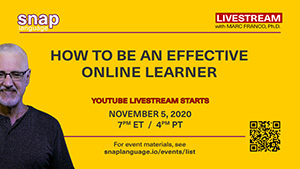Important Note: This article targets primarily high-school– and college-age students. If you are a parent trying to help your younger children do well in remote learning, it is recommended you should work with your children’s teachers and school administrators.
Before the Covid-19 pandemic, institutions that offered virtual courses made sure students understood that online learning is not for everyone. Prospective students were often encouraged to complete a questionnaire assessing whether or not they were “good candidates for online learning.” (See Gannon University, Lane, and Minnesota State for examples of such practices.)

Andrea Piacquadio | Pexels
In 2020, students worldwide were thrown into virtual- or remote-learning courses due to the Covid-19 pandemic whether or not they were “good candidates for online learning.” Many students felt that online learning was not for them, but they had no choice. If you feel this way, you may have considered putting your education on hold even though there is no telling when traditional, face-to-face courses will be offered again.
The decision to “fall behind” willingly has future consequences; however, it is avoidable. The purpose of this article is to help learners take simple steps to become more effective in virtual learning.
Perhaps you believe that, if you are not cut out for virtual learning, you are doomed to fail; nonetheless, that does not have to be the case. In fact, if you take control over your online education now, you may even find yourself choosing to take online courses when things “go back to normal” because of the conveniences of virtual learning.
In addition, even after completing your education (in person or online), you will very likely continue learning online. Virtual learning is pervasive in the workplace. People who are ahead of the game choose to continue learning on their own rather than wait for their employers to offer professional development; typically, they take advantage of online resources for that purpose.
Notes about This Article
Livestream. The topic in this article was covered in three Snap Language livestream events. You are encouraged to not only read the present article but also watch the livestream event, so you get all the information on the topic.

Click the above image to watch the video on the Snap Language channel.
Accompanying Material:
Use this PDF Handout to follow along the tasks on page 2 of the article. You can use it before, during, or after reading this article. It is also useful while you watch the livestream.
Characteristics of Effective Online Students
The following are characteristics effective online learners have.
- Effective online learners are goal oriented. Effective learners start tasks knowing what the end product should be, and they take the small steps needed to achieve the task’s final goal.
- Effective online learners work well independently. In face-to-face courses, instructors help students move through each lesson or task. They time activities and move students through the lesson.
In virtual learning, it is up to you, the student, to time your activities and stay on track.
- Effective online learners have good time-management skills. One mistake many students make in online courses is to get to their lessons “when they feel like it.”
Invariably, they end up waiting until the last minute to get started on tasks that require ongoing work. They end up producing poor work and spending more energy on getting it done hurriedly than on learning the content.
- Effective online learners have good communication skills. Without the benefit of oral communication, online students must rely heavily or, depending on the course, exclusively on written communication. Therefore, they must be good communicators, particularly in writing, so they can understand the content and get help from instructors.
- Effective online learners are good readers and writers. Most of the information in a remote learning is presented in writing (e.g., lessons, instructions for assignments, learning activities). Unless you can read and write effectively, it will be difficult to understand and complete instructional tasks well.
- Effective online learners have good technology skills. You need to have basic technology skills so you can log on to your courses, find materials, download or attach documents, and so on. You should also have some basic understanding of how to troubleshoot hardware, software, and internet connection issues. Knowing your way around a word processor is also extremely beneficial.
- Effective online learners have a good study environment. Classrooms are not always conducive to learning if they are cramped or laid out poorly. Similarly, your study environment should be conducive to learning.
- Effective online learners are motivated to succeed. Students motivated to “just get it over with” are less successful than those who are motivated to learn the content. That is the difference between just going through the motions and actively engaging in the learning process.
What if You Don’t “Fit the Effective Online Student’s Profile?”
When they learn about all the characteristics of effective online learners, some students may think, “I have most of those characteristics but, when I took an online course before, I still hated it”
Others may think to themselves, “I don’t fit the profile very well. Does that mean I will never succeed learning online?”
Don’t jump to conclusions! First, not all online courses are the same; therefore, your experiences with online courses will also vary. That one course you took and hated so much some time ago very probably is not representative of all online courses. It may have left a bad taste in your mouth, but you may have much better experiences in other courses.
Secondly—and here is the good news—even if you lack many of those characteristics, there are things you can do to change your behavior and become more effective.
Can You Change?
When faced with a course that you were “forced” into, you still have choices. You can complain endlessly about it, which will only make you feel even more frustrated and discouraged. Conversely, you can also take control of the situation and seek to minimize any shortcomings.
When classes first went online due to the Covid-19 pandemic, teachers and instructors had to scramble to convert to online format the courses they had originally designed for classroom-based instruction. In some cases, they were making changes to their courses as the courses progressed. As the pandemic continued longer than they originally hoped it would, they got better at delivering online instruction.
As a student, you can do the same. You can adapt to the so-called “new normal,” change you learning behaviors, and adjust your mindset towards learning. Changing long-held attitudes is not always easy and takes a deliberate effort.
Up Next: Practical Steps
Continue reading for steps you can take to improve your effectiveness.